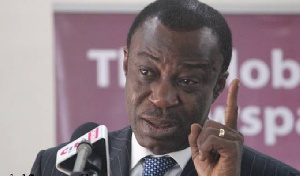Member of Parliament for Old Tafo and ranking member on finance, Dr Anthony Akoto Osei, has cautioned that Ghana will struggle to access the Millennium Challenge Compact II money if government does not streamline the electricity sector.
The Millennium Challenge Corporation (MCC) has earmarked US$498.2million to support the transformation of Ghana’s power sector as well as encourage private investment.
But Dr. Akoto reckons the country risks missing out on the grant if specified conditions are not met in time.
“Both ECG and NEDCO are not financially viable; the MCC will give us the grant if we make them financially viable. In the budget I don’t see any provision being made, so if we don’t meet it how can the money come,” he told B&FT
“One of the conditions is that all the debt owed by government to ECG must be paid by a certain time. In the budget I don’t see any provision being made. They want us to streamline the electricity sector; that is partly why the adjustment is being suggested every three months. If we don’t meet it the money will not come,” he said.
Parliament, before it went on recess, approved the bill which sought to amend the Millennium Development Authority Act, 2006, to expand the objectives and functions of the Authority for it to have the legal backing to enable it implement the terms of Compact II and any other development programme of a similar nature.
The five-year Ghana Power Compact aims at creating a financially viable power sector that will meet the current and future needs of households and businesses -- and ultimately help fight poverty across the country.
The government of Ghana has promised to implement reforms needed to transform the power sector and put it on a path to profitability and sustainability.
Akoto raised concerns in Parliament during reading of the Millennium Development Authority bill, when he indicated that “Parliament has passed an agreement committing Ghanaians to a foreign deal without proper scrutiny”.
He also said that Parliament “passed the MCC-two compact in record time in this House, without most of us paying attention to what is involved there”.
According to him, some “earth-shaking decisions” were taken by Members of Parliament (MPs) without proper examination of the document.
“This is the document that we approved with some strict conditions. The whole process of passing this took three days from the Ministry, to the Executive to Parliament to pass such an important document, because people thought we were going to get an amount US$498million free,” he revealed.
The amendment also expands e functions of the Authority to make it responsible for programmes executed under the Compact 1 and those to be undertaken under Compact II and similar programmes.
According to the committee’s report, the programme under Compact II will focus on developments in the energy sector.
Some of the projects highlighted in the report include the Electricity Company of Ghana (ECG) Financial and Operational Turnaround Project, the National Entrepreneurship Development Company Limited (NEDCO) Financial and Operational Turnaround Project, and the Regulatory Strengthening and Capacity Building Project.
Others involve the Access Project, Power Generation Sector Improvement Project, and the Energy Efficiency and Demand Side Management Project.
Already, the Millennium Development Authority (MiDA) has denied assertions in the media that it is in league with government to privatise the ECG.
MiDA said in a press statement issued in response to media publications about the Ghana Compact II that the compact will play a critical role in Power Africa -- the U.S. government’s initiative to double access to power on the African continent.
It is the largest U.S. government transaction to date under Power Africa, and will serve as an anchor for increased American engagement in Ghana.
“Indeed, the publications and some of the media discussions contain a number of inaccuracies and untruths, which MiDA will fully respond to shortly,” the MiDA statement said.
The Millennium Development Authority Act, 2006, was enacted as a result of Ghana’s participation in the Development Assistance Programme of the United States of America under the Millennium Challenge Account (MCA) in 2006.
The terms and conditions of the Programme were contained in an agreement dubbed Compact 1, between the governments of Ghana and the USA.
Activities carried out under the Compact 1 included the implementation of programmes to transform the rural economy through the use of modern equipment, improvement of social infrastructure in three specific areas -- namely the Southern Horticultural area, Afram Basin and the Northern Belt -- and the construction and rehabilitation of feeder roads to aid movement of agricultural products and trade.
General News of Friday, 14 August 2015
Source: B&FT
MCC money will not come if... – Akoto Osei
Entertainment
















